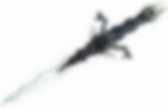

Shakespeare's Macbeth essay, summary, quotes and character analysis. Shakespeare's Macbeth: Fear and the "Dagger of the Mind" Activity 1.
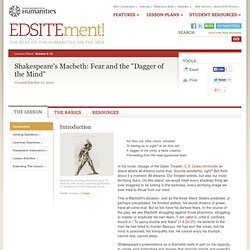
Summarize student responses for when they have felt fear and horror As an opening assignment, ask students to think about times when they have felt fear and horror. What are some of the physical symptoms of fear and panic? What does the face of a fearful person look like? What are some of the various facial expressions of fear? Activity 2. Print out copies of act 3, scene 4, from the online text of Macbeth developed by Dr. Activity 3. Once you have read through the scene as a class, ask students whether there were any passages or events they did not understand.
Activity 4. Next, ask students to work through the details of the scene on their own, writing down the emotions and behavior of characters at various points in the drama. Activity 5. After giving students time to read and reflect on their own, divide the class into several performance groups (three is perhaps ideal; fewer groups will be easier to manage, and the "banquet scene" affords many roles for extras).
Dagger scene with explanatory notes. Please see the bottom of the page and the highlighted text for full explanatory notes and helpful resources.
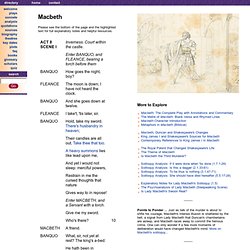
Next: Macbeth, Act 2, Scene 2 ______ Explanatory notes below for Act 2, Scene 1 From Macbeth. Ed. Thomas Marc Parrott. New York: American Book Co. Deepest Consequence. Black and Deep Desires. Sexuality, witchcraft and violence. Macbeth. Shakespeare Videos: Complete List.......Shakespeare Books.......Home.

Study Guide Prepared by Michael J. Cummings.©.2003, 2008 Revised in 2010, 2011, 2012, 2013.© Address Questions or Comments to mcum.mings@mail.com Type of Work .......Macbeth is a tragic stage play. It is one of several Shakespeare plays in which the protagonist commits murder. Key Dates Date Written: Probably by 1605 but no later than 1607. Sources .......Shakespeare based Macbeth primarily on accounts in The Chronicles of England, Scotland and Ireland (Holinshed’s Chronicles), by Raphael Holinshed (?
Settings .......Macbeth takes place in northern Scotland and in England. Tone. Macbeth Essay at Absolute Shakespeare. Macbeth Essay features Samuel Taylor Coleridge's famous critique based on his legendary and influential Shakespeare notes and lectures.
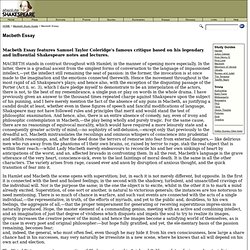
MACBETH stands in contrast throughout with Hamlet; in the manner of opening more especially. In the latter, there is a gradual ascent from the simplest forms of conversation to the language of impassioned intellect,—yet the intellect still remaining the seat of passion: in the former, the invocation is at once made to the imagination and the emotions connected therewith. Hence the movement throughout is the most rapid of all Shakspeare's plays; and hence also, with the exception of the disgusting passage of the Porter (Act ii. sc. 3), which I dare pledge myself to demonstrate to be an interpolation of the actors, there is not, to the best of my remembrance, a single pun or play on words in the whole drama.
In Hamlet and Macbeth the scene opens with superstition; but, in each it is not merely different, but opposite. Speak, I charge you! Is this a dagger. Line Analysis | Readings Page | Home This passage has long been a personal favorite of mine.
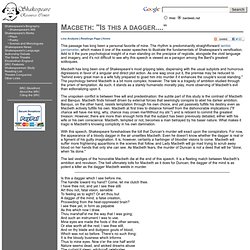
The rhythm is predominantly straightforward iambic pentameter, which makes it one of the easier speeches to illustrate the fundamentals of Shakespeare's versification. Add to it the pure psychological insight of a man standing on the precipice of regicide, alongside the vivid language and imagery, and it's not difficult to see why this speech is viewed as a paragon among the Bard's greatest soliloquies. Macbeth has long been one of Shakespeare's most gripping tales, dispensing with the usual subplots and humorous digressions in favor of a singular and direct plot action.
As one wag once put it, the premise may be reduced to "behind every great man is a wife fully prepared to goad him into murder if it enhances the couple's social standing. " The unspoken conflict is between free will and predestination; the subtle part of this study is the contrast of Macbeth and Banquo. —Act II, sc. i.